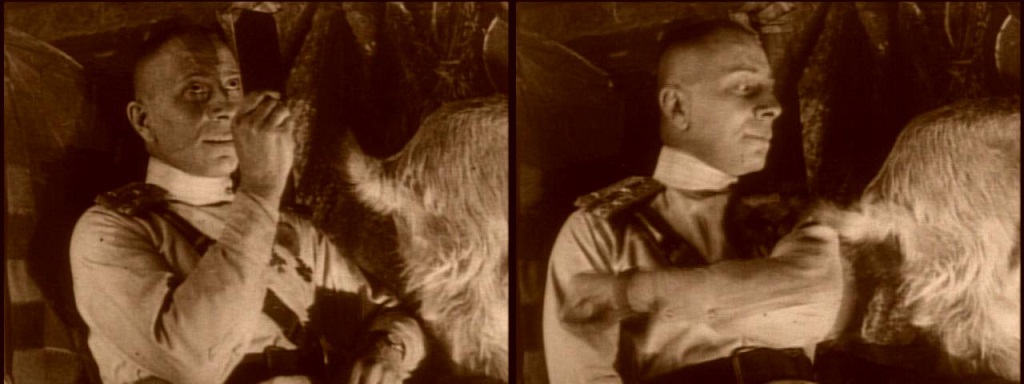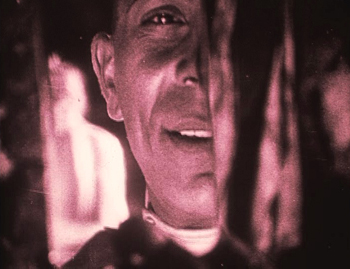Disclaimer: I've noticed that the films are in a slightly different order depending on which edition of the book you look at. So from now on I'm going to just try and go in roughly chronological order, but I probably won't get it 100% right.
-----------------------------------------------------------------
Remember this guy from Sunset Boulevard?
How could you not? Gloria Swanson makes the movie, but he provides a memorable assist. The character's name is Max von Mayerling and he is described as "one of the three greatest silent directors" who is now working for his ex-wife Norma Desmond as her butler. It's some of the most inspired casting in film history, because the actor (Erich von Stroheim) actually was a famous silent director who had been mostly forgotten in America by the time Sunset Boulevard came out in 1950.
Von Stroheim's story proves as well as anyone's how it's possible to totally reinvent yourself in Hollywood, but you have to work hard to stay relevant and be willing to make compromises. Your ego can only carry you so far.
These days he is viewed as an auteur, which I think is just a fancy word for pain in the ass/batshit crazy. For example, he thought many of his movies should run 6-10 hours because he was obsessed with exploring all the details of a story. All the tales behind his films are about him being difficult and inflexible to work with, and he brought down his career by refusing to compromise on his artistic ideals to make commercially successful films.
Foolish Wives is considered the first "big" movie that he directed. It was also the first movie that was advertised as costing over $1 million dollars. It was originally budgeted for $250,000, but Universal Studio estimated it ended up costing $1,225,000 (von Stroheim argued differently, that it cost "only" $750,000).
Foolish Wives takes place in Monte Carlo and tells the story of a con man (played by von Stroheim) who poses as a Russian count. He's known for being a ladies' man and he zeroes in an the young wife of the American ambassador as his next target. Working with him are two female accomplices who pose as his cousins.
In a strange twist of irony, the theme of a man posing as an aristocrat mirrors von Stroheim's own life: he was born Erich Stroheim, son of a lower-middle class Viennese hat-maker, but when he arrived in America he registered himself as Count Erich Oswald Hans Carl Maria von Stroheim und Nordenwall, Austrian noble. He didn't completely get away with the ruse, however; other German speakers in Hollywood outed him as having a lower-class Austrian accent. Others say he didn't speak German at all, and later in life von Stroheim claimed he had forgotten his native tongue completely.
So, you have an enigmatic guy who rewrites his own backstory in America and does the same thing for characters in his films. Despite never having served in the military, von Stroheim often wrote himself into movies as high-ranking military officers.
In addition to casting himself as a smooth playboy-type, this film has another really big hint at von Stroheim's ego in the scene where he first meets his prey as she is reading a book on a hotel veranda. The book's title? "Foolish Wives, by Erich von Stroheim."
I will say that the art direction in this movie is fantastic. The recreation of Monte Carlo is exquisite.
There was one scene that stuck out at me as really creative in which the Count uses a bit of mirror to spy on the diplomat's wife as she is undressing. You see a little sliver of what he is seeing, but the focus is on his face and how much he's enjoying being a voyeur.
One of the trademarks that gave von Stroheim the "auteur" label is the cynicism that pervades his films. This film employs the motif of innocence lost that I've mentioned so much recently, but the difference here is that the bad guy gets a lot more screen time and isn't really presented as, well, a bad guy. The blame is placed pretty squarely on the victim--the film's title is Foolish Wives, not Evil Playboys. It reminds me of Goodfellas: the "bad" guys do bad things, sure, but the lifestyle is just so glamorous and fun, how could anyone resist! It's the other person's fault for being such a schmuck! If the message of D.W. Griffith movies is "watch out for bad guys," the message of this movie is, "bad guys are sexy."
I find von Stroheim to be pretty fascinating, so I'm looking forward to seeing his other movie on the list, Greed.
-----------------------------------------------------------------
Remember this guy from Sunset Boulevard?
How could you not? Gloria Swanson makes the movie, but he provides a memorable assist. The character's name is Max von Mayerling and he is described as "one of the three greatest silent directors" who is now working for his ex-wife Norma Desmond as her butler. It's some of the most inspired casting in film history, because the actor (Erich von Stroheim) actually was a famous silent director who had been mostly forgotten in America by the time Sunset Boulevard came out in 1950.
Von Stroheim's story proves as well as anyone's how it's possible to totally reinvent yourself in Hollywood, but you have to work hard to stay relevant and be willing to make compromises. Your ego can only carry you so far.
These days he is viewed as an auteur, which I think is just a fancy word for pain in the ass/batshit crazy. For example, he thought many of his movies should run 6-10 hours because he was obsessed with exploring all the details of a story. All the tales behind his films are about him being difficult and inflexible to work with, and he brought down his career by refusing to compromise on his artistic ideals to make commercially successful films.
Foolish Wives is considered the first "big" movie that he directed. It was also the first movie that was advertised as costing over $1 million dollars. It was originally budgeted for $250,000, but Universal Studio estimated it ended up costing $1,225,000 (von Stroheim argued differently, that it cost "only" $750,000).
Foolish Wives takes place in Monte Carlo and tells the story of a con man (played by von Stroheim) who poses as a Russian count. He's known for being a ladies' man and he zeroes in an the young wife of the American ambassador as his next target. Working with him are two female accomplices who pose as his cousins.
In a strange twist of irony, the theme of a man posing as an aristocrat mirrors von Stroheim's own life: he was born Erich Stroheim, son of a lower-middle class Viennese hat-maker, but when he arrived in America he registered himself as Count Erich Oswald Hans Carl Maria von Stroheim und Nordenwall, Austrian noble. He didn't completely get away with the ruse, however; other German speakers in Hollywood outed him as having a lower-class Austrian accent. Others say he didn't speak German at all, and later in life von Stroheim claimed he had forgotten his native tongue completely.
So, you have an enigmatic guy who rewrites his own backstory in America and does the same thing for characters in his films. Despite never having served in the military, von Stroheim often wrote himself into movies as high-ranking military officers.
In addition to casting himself as a smooth playboy-type, this film has another really big hint at von Stroheim's ego in the scene where he first meets his prey as she is reading a book on a hotel veranda. The book's title? "Foolish Wives, by Erich von Stroheim."
I will say that the art direction in this movie is fantastic. The recreation of Monte Carlo is exquisite.
There was one scene that stuck out at me as really creative in which the Count uses a bit of mirror to spy on the diplomat's wife as she is undressing. You see a little sliver of what he is seeing, but the focus is on his face and how much he's enjoying being a voyeur.
One of the trademarks that gave von Stroheim the "auteur" label is the cynicism that pervades his films. This film employs the motif of innocence lost that I've mentioned so much recently, but the difference here is that the bad guy gets a lot more screen time and isn't really presented as, well, a bad guy. The blame is placed pretty squarely on the victim--the film's title is Foolish Wives, not Evil Playboys. It reminds me of Goodfellas: the "bad" guys do bad things, sure, but the lifestyle is just so glamorous and fun, how could anyone resist! It's the other person's fault for being such a schmuck! If the message of D.W. Griffith movies is "watch out for bad guys," the message of this movie is, "bad guys are sexy."
I find von Stroheim to be pretty fascinating, so I'm looking forward to seeing his other movie on the list, Greed.






No comments:
Post a Comment